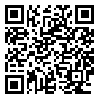BibTeX | RIS | EndNote | Medlars | ProCite | Reference Manager | RefWorks
Send citation to:
URL: http://rjms.iums.ac.ir/article-1-488-en.html
Background & Objective: Being as one of the common problems in neonatal period especially among preterm infants, jaundice can be found among 60-80% of them. One of the traditional drugs used for newborns’ jaundice is shirkhesht(bot.purgative manna) which has been widely used in Iran & Afghanistan. The purpose of this study is to evaluate the effect of shirkhesht on newborns’ indirect hyperbilirobinemia.
Method: In this prospective double-blind assessment, 104 newborns suffering from indirect hyperbilirobinemia in the newborn intensive care unit of Imam Reza Hospital, Mashhad University of Medical Sciences, were selected and then divided into two groups namely case and control groups including 50 and 54 subjects respectively.
Results: In this study there was no significant statistical difference in bilirobin levels of both groups when they were admitted into the hospital. This difference was also not significant after treatment. The average length of admission and phototherapy for case and control groups was 39.12 hours and 35.11 hours respectively which was not statistically significant(p=0.80).
Conclusion: According to the results of this study, using 6 grams (0.21 ounces) of shirkhesht is not more effective than placebo in the treatment of neonatal jaundice.





